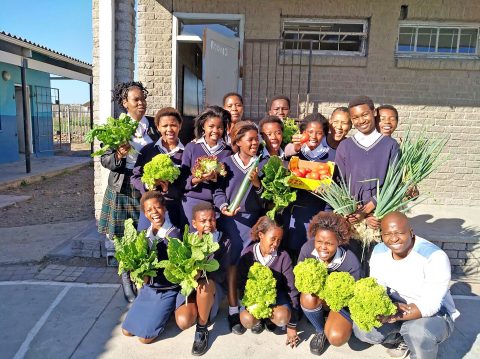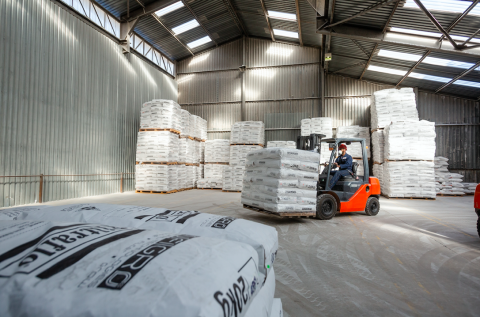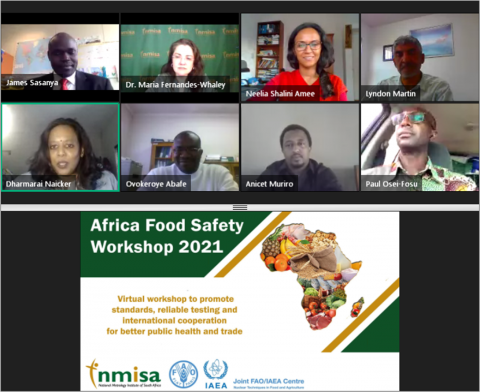CSI Sunday Times
Feeding A Hungry Nation
Support for food relief and feeding schemes increased from 31 per cent of corporate social investment (CSI) spend in 2017 to 44 per cent in 2018, according to research conducted by CSI consultancy Trialogue. Food security and agriculture was supported by 34 per cent of companies and received nine per cent of CSI expenditure in 2018.
The Towards measuring the extent of food security in South Africa: An examination of hunger and food inadequacy report, published by Stats SA, says that 6.8 million people went hungry in 2017, and 10 million did not have enough food. Most of the hungry live in rural and semi-rural areas and townships.
According to the report, families who turned to subsistence farming to supplement their income were far less likely to go hungry: “The involvement of households in agricultural activities for subsistence farming can play an important role in reducing the vulnerability to hunger of rural and urban food-insecure households.”
Enough food is produced in South Africa, and enough is imported, however, not everyone can buy food, because it is not affordable, and there is a 29 per cent unemployment rate. A basket of food, tracked monthly by the National Agricultural Marketing Council shows the cost of basics, such as maize, sugar, polony, baked beans, milk, cheese and brown bread has increased steadily this year.
Compounding the crisis is a stark warning by the World Wide Fund (WWF) for Nature that South Africa’s food crisis is going to get worse if agricultural practices are not corrected. WWF’s Agri-Food Systems: Facts and Futures report states that South Africa will have to produce 50 per cent more food by 2050 to feed an estimated population of 73 million people. According to the report, smallholder farmers do not have support, and the bigger players are squeezing the smaller ones out of the market. The report also states that the cost of healthy food is too high.
Food garden
While assisting in building food gardens may seem passé, an evaluation by the Western Cape Department of Agriculture showed that, if provided with support and assistance, food gardens thrived and the crops could easily account for a quarter of food needed.
In the department’s 2017 suitcase programme, 71 community food security projects, 16 school food gardens and 1 059 households were given a suitcase containing seeds, garden tools, irrigation aids and fertilisers — everything needed to establish a food garden. An impact evaluation found that 78 per cent of supported community food gardens, 93 per cent of schools and 65 per cent of households supported, were able to maintain productive gardens. Almost a quarter of food consumed came via self-produced means such as vegetable gardening. Before receiving assistance, only 33 per cent of the food needs of the beneficiaries were always met by the community food gardens. After receiving assistance, this increased to 80 per cent of food needs always being met. For households, this measure increased from 37 per cent before assistance was received, and 76 per cent after.
Investing in training
Reducing hunger is one of the goals of agricultural services company Afgri Group Holdings (AGH). Head of impact at Afgri, Marion Shikwinya, says: “We consider CSI an integral part of our business. Our core focus areas are food security, water security, poverty alleviation and education. Our vision is to drive food security across Africa.”
Over the past four years, the company spent R30-million on its CSI projects. In that time there has been an incredible jump in support for food security, from assisting less than 1 379 learners in 2014/2015 to reaching a staggering 26 034 learners this past year.
In 2018, it provided capital, equipment, training and thousands upon thousands of spinach, tomato, and onion seedlings, and heads of cabbage and kale to 37 schools. Produce was harvested and cooked for the school nutrition programme. The company trained 37 teachers, 185 learners and 37 community members with accredited subsistence garden training. Afgri also drilled boreholes in six schools. The project has been so successful that schools have harvested bumper crops and been able to sell excess veggies.
In addition to school food gardens, 134 people were trained to become subsistence farmers, giving them the opportunity to feed themselves, their families and to sell their produce.
The company has set itself a task to work on food security beyond its CSI budget. In 2012, Afgri set up Harvest Time Investments (HTI), a training and development programme focused on unlocking the potential of emerging black farmers through training, development and mentorship. Two years later, Afgri further committed to assisting the development of emerging farmers, as well as assisting other projects targeted at community and rural developments, through an agreement with the public sector, including the Department of Economic Development, the Department of Trade and Industry, the Department of Agriculture, Forestry and Fisheries, and the Department of Rural Development and Land Reform. In terms of this agreement, Afgri pledged R90-million, spending R60-million on emerging farmer development and R30-million on community support over four years.
Today, the R90-million investment in farmer training and development and related CSI initiatives has resulted in a meaningful contribution to the economy. In the past four financial years alone, AGH focused on food security, water security, poverty alleviation and education through 112 CSI initiatives.
Female farmers
As with Afgri, Total SA looks at CSI as an opportunity for people to grow and to encourage them to become self-sufficient. They also place huge emphasis on food security and climate change.
For the past 20 years, the oil and gas company and the Department of Agriculture, Forestry and Fisheries has been co-sponsoring the Female Entrepreneur Award (formerly the Female Farmer of the year award). This year, Mmathoko Jarita Mabula won the overall award.
Mabula runs the Mahlohonolo Investments’s egg-laying project in Bela-Bela, Limpopo. The project was started in 2014 with four production houses. It soon expanded with a further four houses. Mahlohonolo Investments has 2 000 beneficiaries and employs 17 permanent and 10 casual workers. Its 15 000 layers produce 100 000 eggs a day.
Mabula won R930 000 that will be reinvested back into the business. She won in the category of the provincial leg of the competition and was overall provincial winner in Limpopo. She went on to win the same category nationally.
Total SA’s CSI manager, Nyameka Makonya, says there are many reasons why Total is passionate about supporting female farmers. Only about a third of the agricultural industry’s workforce is made up of women. The effects of improving women’s participation rates in commercial farming are far-reaching. Studies have shown that women’s incomes have a big impact on food security, and it follows then, that increasing the number of women drawing salaries and wages from the industry could, in turn, also help tackle the challenge of food insecurity.
Historically, the farming sector has been in the control of white males, and the programme was to encourage more women to venture into farming. “Women have a good understanding of food insecurity,” says Makonya.
“Historically, when men went away to the mines and the cities to work, women took responsibility to care for the family and to ensure there was food. Many lessons around food, finding and providing food were learnt. Female farmers are far more likely to share their produce with others and to support the less fortunate.
“Total has seen 400 female farmers, including co-ops who were given state land to farm, go through the programme. Many have gone on to employ workers. Some of the farmers have become wealthy. We have now partnered with Old Mutual to offer financial literacy workshops.
“This programme surpassed our expectations, it has not only changed individual lives, but also the lives of people around them. More people are able to put food on their tables because of these female farmers,” Makonya says.
In addition to the female farmer programme, Total has ploughed money into school gardens. Makonya says the gardens are becoming increasingly important as more people become unemployed and as food becomes increasingly expensive.
“The vegetables are used to cook a meal for the children — for many, it is the only meal of the day. Children go to school hungry, how are they meant to learn and excel if they do not have food? Because of the high cost of food and the high rate of unemployment, there is less money for food. At least here they get one meal a day.”
Makonya says unemployed parents are working in the food gardens and can take some of the produce home with them.
The importance of food security has even changed the way Arbor Day is viewed. Makonya says their community initiatives around planting trees have morphed into food gardens. “All of this shows the importance we place on food security.”
Food security
Long-term food security should also rest on ownership and the Land Bank has been working steadily to ensure farmers are given the correct skills to ensure prosperity.
The state-owned bank has a mandate to work toward food security. It is training up farmers as part of a long-term strategy. However, because it cannot offer loans or assistance to subsistence farmers, it has made nutrition part of its CSI programme.
Land Bank’s executive manager for strategy and communication, Sydney Soundy, says they have a R5-million CSI budget to upskill and provide resources to households to improve food security and reduce vulnerability to hunger. “Our development, sponsorship and social investment initiatives are primarily focused on rural communities, townships, informal settlements and mining areas. It has programmes to upskill smallholder farmers in sustainable agricultural practices and employment opportunities; and sector growth and transformation to build the agricultural sector skills focusing on greater youth and women participation.”
The Buhle Farmers Academy, in partnership with the Industrial Development Corporation, is the Land Bank’s flagship project. Previously the programmes provided basic skills and needs, such as upskilling subsistence farmers. Now they are working with farmers, who successfully implemented the initial training, and who showed the potential to upscale to sustainable enterprises.
“The project has been providing skills training and mentoring to aspiring, previously disadvantaged farmers since 2017 and has worked with 272 beneficiaries. The project is being assessed and developed in the areas of farm profitability, financial support and skills development. The focus of the project is to help subsistence farmers become small-scale commercial farmers; it aims to develop 10 to 15 farmers to be investment-ready, providing them with a solid business foundation,” explains Soundy.
“The Land Bank has also supported the expansion of school food gardens from providing the skills and tools, such as seedlings for schools to be self-sustainable to helping to expand the gardens. Now there is surplus produce for the school to sell.”
There is also a massive Land Bank project in the Eastern Cape, where 1 500 emerging farmers are producing vegetables for market. In partnership with the Gauteng Provincial Department of Economic Development, Agriculture and the Environment, it runs a food garden programme: some of the gardens are in communal areas while others are at schools. Surplus vegetables are sold to bring in revenue.
The Land Bank’s multipronged approach to dealing with food security ensures initiatives designed to spark interest in agriculture. “It creates interest and appetite for involvement in agriculture by youth from the disadvantaged communities. Our project activities provide a platform that exposes young people to both business and career opportunities in the agricultural sector,” Soundy says.
“These programmes are important to the Land Bank as they complement our business activities and our mandate in support of improvement of the sector towards inclusive growth, transformation, employment and food security,” he concludes.






 Sign-up and receive the Business Media MAGS newsletter OR SA Mining newsletter straight to your inbox.
Sign-up and receive the Business Media MAGS newsletter OR SA Mining newsletter straight to your inbox.